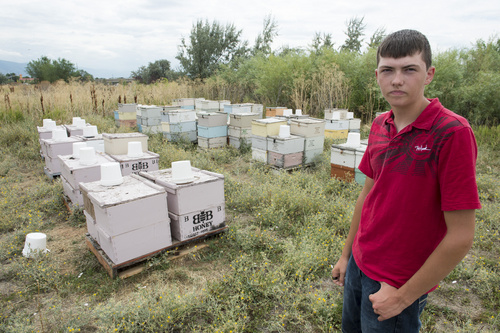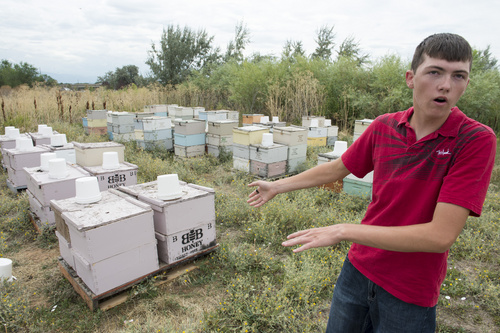This is an archived article that was published on sltrib.com in 2014, and information in the article may be outdated. It is provided only for personal research purposes and may not be reprinted.
Two teenage brothers, who maintained beehives to help pay for their Mormon missions, were stung last week — not by the insects, but by thieves.
The bee rustlers took frames — filled with bees and honey — from 24 hives owned by 15-year-old Bryce Bunderson, a student at Bear River High School, and his brother Tate, currently serving in the Arkansas-Little Rock Mission.
The damages total nearly $12,000, when the family adds up the lost honey, about 768 pounds worth, lost pollination income and replacement costs.
Cache Valley's Slide Ridge honey company — best known for its honey wine vinegar — maintains hives in the same field in Layton. The thieves also took bees and frames from a few Slide Ridge hives, but co-owners Martin James and his sisters, Kelli and Karla, say their losses are small and the company can recover.
They are more upset about the loss to the Bunderson boys — whose father, Jim, is one of their employees.
"With a single event, these selfish, good-for-nothing thieves wiped out two young men's hard-earned missionary income, leaving the parents to scramble to replace it," Slide Ridge wrote on its website.The company is asking fellow beekeepers to be on the lookout for suspicious activity.
"If you hear of someone recently purchasing a large block of queens or other supplies to suddenly beef up incomplete hives, we would appreciate it if you could let us know," the website continued. "And if someone seems to have suddenly increased their bee count, or converted failing hives to thriving hives, perhaps you should question their origin."
The Wasatch Beekeepers Association and The Lion House Pantry also have stepped in to help the Bundersons, added James. They are encouraging beekeepers to donate their honey to help the boys recover their losses. (See box for more details.)
Bryce Bunderson, who lives in Deweyville, said that he and Tate started the hives about six years ago, first as 4-H and FFA projects, but later to help earn money for their missions. He said the Layton hives have been extremely healthy and productive.
During a visit last week, the hives were doing so well that Bunderson and his father decided to return the next day to add more space to the bee boxes.
When they arrived, Bryce Bunderson said, "we could tell something was wrong."
At first, they thought someone had sprayed weed killer. "But we looked everywhere and there were no dead bees," he said.
They called a bee inspector, who said it looked like someone with beehive knowledge had taken the bees.
Bunderson said the thieves moved the lids of the hives, took out the central frames that held the bees and put empty frames in their place so it looked like nothing had been disturbed.
"They took the heart of each hive," said Bunderson, who hasn't gathered enough strength to tell his older brother of the crime, which he reported to Clearfield police.
While bee rustlers steal hundreds of hives at a time in California, "this is the first one in Utah that I have heard about," said Cody James, the acting director of the Animal Industries Division for the Utah Department of Agriculture.
It was bound to happen, though.
The recent die-off of America's bee population means there are simply fewer bees to pollinate the country's food crops. That makes healthy bees a valuable commodity.
In California, more than a million colonies of honey bees are needed to pollinate the state's almond orchards alone. California beekeepers can't meet that demand, so commercial hives from all over the United States — including Utah — are hauled on trucks to the San Joaquin Valley each year for the bloom, according to the Almond Board of California.
Beekeepers in Utah, such as the Besses and Bundersons, get $170 for every hive they ship to California for the two-week almond crop pollination.
Other agricultural thefts in Utah also remain relatively low, said James.
In 2013, there were reports of 700 head of sheep, 250 head of cattle and 25 horses that were stolen by rustlers, according to Department of Agriculture statistics. But with "the price of cattle off the charts," there have been more cattle-related thefts in 2014.
Thieves — whether they steal cows or bees — could face serious charges if caught, said James.
"Stealing an agricultural commodity is a second-degree felony in the Utah Code," he said, "and bees are part of that." —
How to help
The Wasatch Beekeepers Association and The Lion House Pantry are encouraging beekeepers to donate their honey to help the boys recover their loses. Also, anyone from the public can make a monetary donation. Proceeds will help the Bundersons restart their hives. Those who donate will get free Lion House rolls with honey butter.
Where • Lion House Pantry, 63 E. South Temple, Salt Lake City; 801-363-5466
When • Donations accepted during regular business hours, Monday-Saturday, 11 a.m. to 8 p.m.





